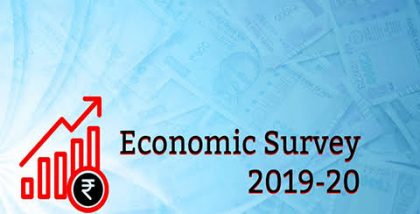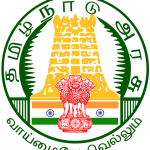
Introduction
The two-volume Economic Survey this year, printed in lavender – the same as the colour of the new 100 rupee currency note, projected India’s economic growth at 6 per cent to 6.5 per cent in the next financial year starting April 1, saying the economy has bottomed out.
Explaining the colour and the intent behind this year’s survey, Chief Economic Advisor Krishnamurthy V. Subramanian said the choice symbolizes the blending of the old and the new. Subramanian picked wealth creation as the broad theme. “Wealth is both a cause and effect of investment. That is why it is important for us to focus on wealth creation”.
Here are the key highlights from this year’s survey :
India’s economic growth is expected to “strongly rebound” to 6-6.5 per cent in 2020-21 from 5 per cent estimated in the current fiscal. The Survey said there are tentative signs of bottoming out of slowdown in manufacturing activity and global trade, which will have a positive impact on growth in the next fiscal.
Considering the urgent priority of the government to revive growth in the economy, the fiscal deficit target may have to be relaxed for the current year, the survey said.
The Economic Survey 2019-20 has proposed India can create well-paid four crore jobs by 2025 and eight crore by 2030 by integrating “assemble in India for the world” into government’s Make in India initiative and exporting network products that can give substantial push to India’s target of becoming a $5 trillion economy.
India’s GDP growth is neither overestimated nor underestimated and the concerns on data are unfounded. It said that cross-country comparisons are fraught with risks of incorrect inference due to various confounding factors that stem from such inherent differences.
Government interventions like debt waiver or food subsidies end up creating distortions in the functioning of the free market. The Survey says that debt waiver schemes disrupt credit culture and disrupt formal credit flow to the very farmers it aims to benefit.
The country needed to spend $1.4 trillion on infrastructure to remove the constraints in growth, as power shortages, inadequate transport and poor connectivity affects overall growth performance, and to achieve a GDP of $5 trillion by 2024-25.
India’s balance of payments position improved the USD 433.7 billion by September 2019 from USD 412.9 billion of forex reserves in March 2019, says Economic survey 2019-20. India’s foreign reserves are comfortably placed at USD 461.2 billion as on 10th January 2020. Further, the external debt levels remained low at 20.1 per cent of GDP by the end of September 2019.
The Economic Survey pinned its hope on uptick in growth of cumulative GST collections in October 2019 and November-December to contain fiscal deficit at the budgeted 3.3 per cent for FY2020.
The Survey suggested providing ESOPs to public sector bank employees to enable them to become owners in the banks. Employee stock ownership plans (ESOPs) will incentivise the bank employees to embrace risk-taking and innovation continually, it said.
It takes more documents to open a restaurant in Delhi as compared to documents needed for a license to procure new arms and major fireworks, says the Economic Survey for 2019-20.
Funding of the Rs. 102 lakh crore National infrastructure pipeline recently unveiled by the Indian government “would be a challenge”, the Economic Survey for 2019-20 said.
The survey cited a new selloff mode. In the model, the government can transfer its stake in the listed CPSEs to a separate corporate entity which would be managed by an independent board and would be mandated to divest the government stake in these CPSEs over a period of time.
As per the pre-Budget survey, services exports have outperformed goods exports in the recent years, due to which India’s share in the world’s commercial services exports has risen steadily over the past decade to reach 3.5 per cent in 2018, twice the share in world’s merchandise exports at 1.7 per cent.
Indian companies garnered nearly Rs. 74,000 crore through public issuance of equity and debt during April-December this fiscal, a 66 per cent jump from the preceding financial year, with rights issue emerging as the most preferred route for financing business needs. Companies had raised Rs. 44,355 crore in the April-December period of 2018-19.
In India, affordability of vegetarian ‘thalis’ improved more compared to non-vegetarian ‘thalis’ in last 13 years. Affordability of vegetarian ‘thalis’ improved by 29 per cent while that for non-vegetarian ‘thalis’ by 18 per cent from 2006-07 to 2019-20. As a result, an average household of five individuals that eats two vegetarian ‘thalis’ a day, gained around Rs 10,887, on average per year, while a non-vegetarian household gained Rs 11,787, on average per year.
The Survey pointed out high drop out rates at various levels of schooling and lack of affordability in higher education as areas of concern. The Survey emphasised that Samagra Shiksha 2018-19, was launched to envisage school education as a continuation from pre-school to senior secondary level to provide access to education to all.
According to the Survey, foreign tourist arrivals to India on e-visas, which are available for 169 countries, have increased from 4.45 lakh in 2015 to 23.69 lakh in 2018 and stood at 21.75 lakh in January-October 2019, recording nearly 21 per cent year-on-year growth in the tourism sector.
India’s mineral output has witnessed a notable turn around on account of reform measures initiated by the government.
Thirukural used in the economic survey
“Wealth, the lamp unfailing, speeds to every land,
Dispersing darkness at its lord’s command.”
– Thirukural, Chapter 76, verse 753.
“Make money – there is no weapon sharper than it
to sever the pride of your foes.”
– Thirukural, Chapter 76, verse 759.
“The just man’s wealth unwasting shall endure,
And to his race a lasting joy ensure.”
– Thirukural, Chapter 12, verse 112.
“The one who utilizes all resources and opportunities at hand is an efficient (entrepreneur) and nothing is impossible for him to achieve.”
– Thirukural, Chapter 76, verse 753.




